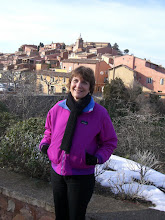
For those readers who have not had a lot of experience traveling in France, I thought I’d offer a few pieces of advice and general reflections. First of all, despite what some folks might try to tell you, French people are quite friendly and welcoming. Just learning and using a few simple phrases of their language can help to make things go a lot easier. Learning to say bonjour is number one; meaning “hello,” “good morning,” or “good afternoon,” it is, in my estimation, the most frequently employed word in the language as well as one of the most important. (Bonsoir, by the way, is used after dark for “good evening.”) One of the hardest things for Americans to grasp is that greeting people is extremely important in this culture and in other Francophone areas. This includes saying “hello” to people who are serving you in any capacity: the clerks at the hotel, bus drivers, ticket takers on trains, all salespeople, workers in a fast food restaurant or a bookstore, etc. In fact, you should greet practically everyone you make eye contact with, particularly in small towns. Not hearing “hello” from others feels very offensive to French people and the same is true in the case of “good-bye”—au revoir. Once you have the greetings down, just add s’il vous plaît (for “please”) and merci (for “thank you”) to your vocabulary and voilà, you’re well on your way to becoming a model tourist.
Train travel is one of the most comfortable ways to see the country. An easy thing for inexperienced travelers to forget is to composter le billet—you have to stamp your ticket to validate
My final topic, if I may be so bold, has to do with public restrooms. There are very few, it seems, especially in small- to medium-sized cities and towns. We were just in Montpellier over the weekend and had to really scour around to find les toilettes. Nearly all department stores,

3 comments:
Bonsoir Madame!
Mac-Do and Quick are the best public restrooms in all of Europe.
Another thing you could have brought up is, what "Emile" said in his latest post, Train Etiquette. Should you talk on your cell phone in the train, or talk in your "outside voice"?
A bientot
Coucou, HighDef!
Thanks for the comments. We did try Macdo, but you have to wait in line to get the code for the restroom. As for the cell phone question in the train, there are now signs showing a happy cell phone in the hallway of our TER and a sleeping phone in the compartment. :)
I think most people forget their manners when they go to a different country, not because they are rude but just because they are just not accustomed to how things usually work in a different country. However, this is not a valid excuse I know but that's why I believe it is good for people to travel, and or study abroad in order to become a universal citizen and more cultured. One would be extremely surprised at how much you change once you have been abroad and experienced the world. As much Americans try to say that the French, or any other culture is rude we never realize that maybe the way that we treat people is not so nice. We rarely say good morning to each other anymore, I have myself have passed professors on this campus several times saying "Hi" instead of "Good Morning/Afternoon/Evening" so yeah in order to help ourselves we must re-teach ourselves standard etiquette. Also, I am surprised at the fact that you have to pay for Public Restrooms I think that is a bit odd but I mean it is also strange that we pay large sums of money for our health care system as well. Surprising what types of things have become a commodity in today's economy.
Post a Comment